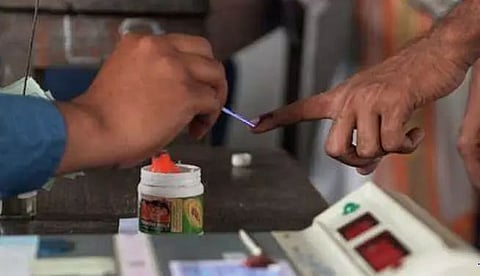
- Home
- Live Blog
- Breaking News
- Top Headlines
- Cities
- NE News
- Sentinel Media
- Sports
- Education
- Jobs

Promises galore during elections and promises forgotten by ruling party return after five years. Many unfulfilled promises are often repackaged under the garb of electoral promises. The parties, irrespective of their ideologies, come up with new promises as they know well there are gullible voters who can be wooed. Unkept promises erode trusts of conscious electors in the exercise of electing governments. Such erosion of trust is not healthy for democracy as it widens the gap between the people and the government. For democracy to become robust, active participation of the voters in the electoral exercise is a precondition. Such participation cannot be limited to voters attending poll rallies, listening leaders and candidates making promises and casting votes. It also warrants voters carefully examining if the promises made are realistic or unachievable. The exercise of electing representatives and formation of new government after every five years to remain credible, the parties and candidates are required to be honest in admitting failure to fulfil poll promises and explain to voters as to why some of the promises remain unfulfilled. Publication of election manifestos is an important exercise for the parties and candidates to present roadmap of governance activities for the next five years. These manifestos do not reach majority of voters making it difficult for them to make correct assessment of all the promises. The opposition Congress is aware of the challenges that promise to solve unemployment problem and undertaking welfare measures may not find too many takers as similar promises made by the ruling Bharatiya Janata Party (BJP) remained unfulfilled. The opposition party, therefore, has articulated guarantees to replace promises in order to sound more convincing. The five guarantees pledged by the opposition party includes five lakh jobs, monthly income support of Rs 2000 to women, 200 units of free electricity, daily wage of Rs 365 to tea garden workers. The ruling BJP has also promised to increase the amount of monthly cash assistance under Orunudoi scheme to over 18 lakhs Below Poverty Line families from current rate of Rs 830 to Rs. 3000. Such guarantees of promises by both the ruling and opposition parties will require huge funding but there is no clarity if the State government would have enough resources to fund such schemes and programmes. Even if the fund is made available to the State government how far it is prudent to spend huge amount of fund for household consumption with no tangible return is the question that voters need to ponder before falling for it. The election is the right time for the voters to undertake a serious review of the long-term consequences of creating a beneficiary regime sought to be created either by the ruling party or the opposition party in a development-deficit state that reels under fund crunch. The importance of welfare scheme to provide financial relief to families affected by adverse economic condition or lack of adequate development cannot be ignored. Such relief measures must be complemented by focusing on creating the ecosystem that creates livelihood and avenues of self-employment to make development initiatives sustainable. After all, the money spent for public-funded welfare schemes and projects is paid by taxpayers and borrowing money from the market to fund such schemes only adds to per-capita burden and does not help in improving the economic condition of the people to become self-reliant. Economists are cautioning that increasing the amount of cash assistance schemes runs the risk of withdrawal of more people from income activities in unorganized sectors that fetches less income than the amount given out to a beneficiary. This in turn may lead to shortage of workforce that is crucial to implement various development activities of the government critical for progress of the State. In order to prevent such an exodus, the government will then need to increase the minimum wages in the unorganized sectors to a level more than the amount given for free under welfare schemes. The burden on the state resources on account of such increase can be well imagined. Parties, both ruling and opposition, instead of engaging in a competition of promises or guarantees to woo electors should hold more consultations with independent experts to examine if such poll promises or guarantees would contribute towards achieving the sustainable development goals of the state or derail them. A comprehensive roadmap to improve governance mechanism and delivery of services will go a long way in creating the ecosystem that empowers the people to become self-reliant. Ensuring remunerative prices for farm produces is more important for the state with majority of the population dependent on farming as the primary sources of livelihood. Keeping prices of essential commodities under control is essential to ensure that remunerative prices are not neutralized by inflation. Voters must be well informed to be able to take the right decision.